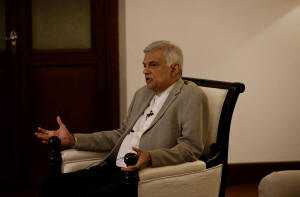Sri Lanka's prime minister takes on crucial finance ministry portfolio
 Send a link to a friend
Send a link to a friend
 [May 25, 2022] By
Uditha Jayasinghe [May 25, 2022] By
Uditha Jayasinghe
COLOMBO (Reuters) -Sri Lanka's Prime
Minister Ranil Wickremesinghe will hold dual charge as finance minister,
the president's office announced on Wednesday, and will lead talks with
the International Monetary Fund (IMF) as the crisis-hit nation seeks a
bailout.
"Prime Minister Ranil Wickremesinghe was sworn in as finance, economic
stabilisation and national policies minister before President Gotabaya
Rajapaksa this morning," a statement from the president's office said.
In an interview with Reuters on Tuesday, Wickremesinghe laid out his
immediate plans for the economy, including presenting an interim budget
within six weeks that will slash government expenditure "to the bone"
and re-route funds into a two-year relief programme.
Sri Lanka, an island nation of 22 million people, is reeling under its
worst economic crisis since independence in 1948, with a severe shortage
of foreign exchange severely curtailing imports, including essentials
such as fuel and medicines.
The turmoil has come from the confluence of the COVID-19 pandemic
ravaging the country's lucrative tourism industry and foreign workers'
remittances, ill-timed tax cuts by Rajapaksa draining government coffers
and rising oil prices.

On Tuesday, the World Bank said it is not planning to provide any new
financing to Sri Lanka until an adequate economic policy framework has
been put in place.
Trade Minister Ramesh Pathirana told Reuters the new budget "will set
out a path for multilateral institutions and other lenders to track
public finance targets and hopefully extend support to Sri Lanka".
In the interview, Wickremesinghe said he hoped for a "sustainable loan
package" from the IMF, while undertaking structural reforms that would
draw new investments into the country.
Initial discussions with the IMF ended on Tuesday. Earlier this week,
IMF Managing Director Kristalina Georgieva said the lender was "working
relentlessly" at a technical level on Sri Lanka.
Sri Lanka has also been officially declared in default by ratings
agencies after the non-payment of coupons on two of its sovereign bonds.
It has hired heavyweight financial and legal advisers Lazard and
Clifford Chance as it prepares for the difficult task of renegotiating
its $12 billion of overseas debt.
VETERAN POLITICIAN KNOWS IMF
Wickremesinghe, 73, is a veteran politician who has been prime minister
five times before the current appointment.
The economic liberal already has experience with the IMF - Sri Lanka
last had an IMF programme in 2016 during one of his tenures as prime
minister.
[to top of second column]
|

Sri Lanka's Prime Minister Ranil Wickremesinghe gestures as he
speaks during an interview with Reuters at his office in Colombo,
Sri Lanka, May 24, 2022. REUTERS/Adnan Abidi

He has also built relationships with regional powers
India and China, key investors and lenders who vie for influence in
Sri Lanka, which lies along busy shipping routes linking Asia to
Europe.
The problem is that any economic reforms Wickremesinghe may bring to
meet conditions for an IMF programme could cause short-term pain and
trouble on the streets. Petrol and diesel price increases announced
on Tuesday are bound to feed through to transport and food prices.
Annual inflation is already at 33.8 percent and could
go above 40%, Wickremesinghe has said.
Udeeshan Jonas, chief strategist for market research firm Capital
Alliance, said Wickremesinghe retaining the finance portfolio was
largely expected. But Jonas added: "With or without support,
difficult measures will have to be taken. He has no other choice."
Demonstrations have roiled Sri Lanka since late March, with
protesters accusing the president and his powerful family of
mishandling the economy.
Violence broke out two weeks ago after clashes between government
supporters and protesters in Colombo sparked clashes across the
country that left nine people dead and about 300 injured. Mahinda
Rajapaksa, the president's elder brother, resigned as prime minister
after the violence.
President Rajapaksa and Wickremesinghe have since tried to cobble
together a new cabinet of ministers, drawing members from the ruling
party and some opposition groups.
But the critical finance ministry portfolio has, so far, remained
vacant, with some likely candidates declining the job, according to
government and ruling party sources.
Ali Sabry, the previous finance minister who started talks with the
IMF in April, quit in early May when the cabinet was dissolved after
Prime Minister Rajapaksa resigned.

"The finance minister's appointment is extremely crucial because he
needs to get the ball rolling on a new budget, talks with the IMF
and spearhead fiscal support," said Lakshini Fernando,
macro-economist for Sri Lanka-based investment firm Asia Securities.
"Ranil Wickremesinghe is the better option, but we'll have to see if
he has a majority in parliament and if he can do the job of both the
prime minister and finance minister."
(Reporting by Uditha Jayasinghe; Writing by Devjyot Ghoshal; Editing
by Tom Hogue and Raju Gopalakrishnan)
[© 2022 Thomson Reuters. All rights
reserved.]
This material may not be published,
broadcast, rewritten or redistributed.
Thompson Reuters is solely responsible for this content. |